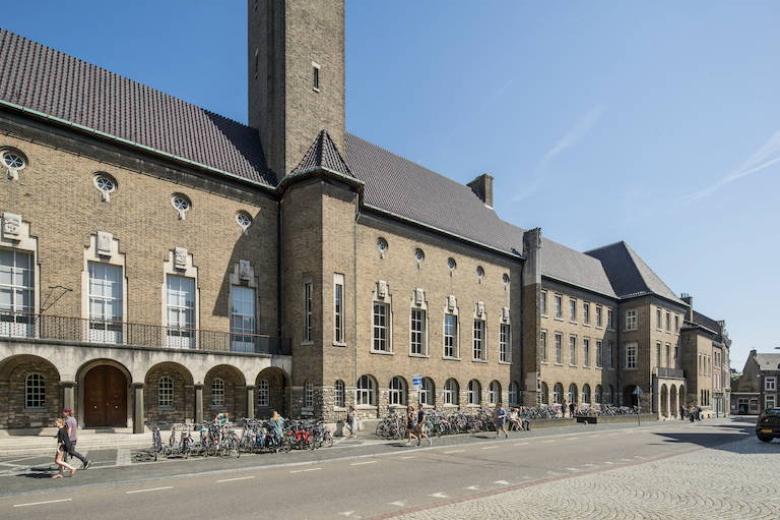Of course, everyone's health and safety always come first. All of a sudden, we are being required to work under very different circumstances and that requires flexibility, adaptation and creative solutions. Fortunately, these initial months have already shown that we are very capable of adjusting. Employees have already implemented good new ways to hold meetings and collaborate with one another. But, of course, questions are also arising and sometimes it takes a while to find out what is now expected of each other. With this information, we want to give you a little more guidance and possibly alleviate some uncertainty.
Working from home as of 31 August 2020 (2020/21 academic year)?
*NEW* What will change on 31 August 2020 (2020/21 academic year)?
"Working from home in principle; on campus in specific cases."
Working from home has been the norm at Maastricht University since March and will remain so. However, since the end of the 'smart lockdown', we have looked for ways to resume the most important activities in the interest of students, employees and the organisation. We have taken safety measures that allow employees to come to campus at certain times for specific tasks, like providing and supporting education or carrying out research in the lab.
What this looks like in practice depends on the respective employees. For most of us, it means that we still mostly work from home. The concrete implementation takes place in dialogue between manager and employees, and is assessed according to the tasks of the respective team or unit.
Another very important criterion is the capacity of our buildings. The application of government measures, such as the 1.5 m distance rule and conditions regarding ventilation, means that we can use no more than 1/3 of the usual capacity. We implement our educational model 'On campus, if you can. Online, if you need to.’ within this framework. This model is important for determining the balance between working from home and working on campus. We have already laid down strict protocols on presence in UM buildings when it comes to research that requires a lab or other on-site facilities.
Risk group
If you belong to a risk group, or if you provide (informal) care to someone in a risk group, or if you are pregnant, you are not expected to come to the workplace until at least 2021. We also take into consideration employees who are wary of coming to campus for other reasons. We ask them to discuss this with their manager and/or the Occupational Health Physician.
UM does not want to oblige anyone who fears for their safety to come to campus. In duly justified cases, the employee can continue to work from home. Where the nature of the work does not allow for this, another suitable position can be assigned temporarily.
You can also read more about working safely in the time of corona and the COVID-19 Safety protocol.
How can I ensure that my home workplace is ergonomically sound?
From the beginning of the corona crisis, government employees have had to work almost entirely from home. UM immediately provided information on how to set up the home workplace ergonomically, the ability to borrow office equipment, and the possibility of asking a health & safety officer for recommendations, etc.
- Check your workplace with the help of a test from the Association of Universities in the Netherlands (VSNU): http://www.kanstest.nl/en
- If it turns out that the layout of your home workplace is not sufficiently ergonomic, you can borrow office equipment from UM (after signing it out). This includes portable equipment such as a monitor, keyboard, mouse, document holder and office chair (a large proportion of the workstations on campus will not be used, making these facilities available for home workplaces).
- If this still does not lead to an adequate solution, working 100% at a UM location can be discussed.
- If working fully at a UM location is not possible, additional office equipment or furniture (e.g. an adjustable table) may be provided.
- In the event of (imminent) complaints or doubts about the correct set-up of your workplace, please contact your prevention officer immediately.
- The prevention officer can provide recommendations by phone or through a video consultation. If desired (e.g. for reasons of privacy), this video consultation can be carried out by the occupational health & safety service HCC.
- Here you will find various tips, such as videos that show how to incorporate periods of movement while doing computer work.
Scenarios
Depending on their job function and their situation at home, different groups of employees are facing a variety of scenarios. For all situations, the following principles apply, provided the health of the employee or duties of care permit.
Every employee whose work allows it and who has access to the necessary facilities, should work from home. Expectations when working from home:
- You should continue your regular work activities as much as possible. If something is not working out, discuss this with your manager so you can find a solution together.
- Your manager and your colleagues must know how to reach you.
- Your manager must ensure, to the extent that it is possible, that you have the necessary facilities to be able to work from home (e.g. a laptop and access to the UM networks). To this end, you and your manager should briefly discuss what you need. Bear in mind, however, that in these circumstances, we cannot always offer the same level of occupational health and safety for your home workplace as for your UM workplace. Nevertheless, it is important that you inform yourself about sensible guidelines for working from home. UM offers tips and information to help you set up a good workplace at home. In addition, it is possible to temporarily use certain items or equipment from your UM office at your home workplace (e.g. your chair or monitor). This should be agreed on with your manager. See the tips below. If you are looking for information about network connections for working from home visit our FAQ about IT-support or the ICTS manuals.
- As a result of the cyber attack in December and the corona crisis, we have experienced how essential a safe and reliable computer network is. Our ICT staff work 24/7 to make sure that we can work in a secure digital environment. However, we are jointly responsible for keeping hackers out. Your behaviour also contributes to a secure IT landscape! So please stay alert, even while you are working on your own computer at home. Here you can read about how you can contribute to the security of UM systems.
- It is important to remember that working from home requires a different type of communication than you are used to. Your manager is expected to keep you and your colleagues as informed as possible about priorities and issues relevant for your team. You are asked to keep your manager and any team members as up to date as possible regarding the progress of your work. Communication about this can take place in various ways, for example, through app groups, weekly updates via email, conference calls, or a daily coffee talk online during which everyone is kept up to date. Together with your manager and team, look for a suitable way to communicate.
In what circumstances are you allowed to physically come to work?
UM is following the national guidelines and advice of the government. The advice of the government is currently to work from home, unless... This 'unless' can include a lot, for example, many crucial professional groups who have to continue their work in emergency services and hospitals. For UM, this 'unless' concerns people who perform a vital, critical function that cannot be performed from home. Discuss this with your manager and ensure that you are never alone in a building. Employees who are physically present are explicitly expected to observe social distancing (keep 1.5 metres distance from one another, do not shake hands). This also applies to people who have fully recovered from COVID-19 (according to a doctor) and who, in consultation with their manager, return to work on location (for now only in vital functions).
An employee whose job does not allow them to work from home (vital functions for UM) will be expected to be physically present at work, unless health problems arise. Social distancing (see description in Dutch) will be strictly observed. UM will ensure that employees can sit far enough apart from each other and that measures are taken to prevent contamination.
For an employee with a job that cannot or does not have to be performed due to circumstances (such as an employee who works at a reception or education desk that is currently closed), there are a number of possibilities:
- You can temporarily perform other work that can be carried out from home or on location. Discuss with your manager which tasks (possibly from another team) you can perform.
- You can sign up to help in areas where there is a need for support. If you are in a position to help, register via staffcareercentre@maastrichtuniversity.nl. The UM Staff Career Centre is coordinating this and will match requests for help with volunteers who come forward.
An employee with care responsibilities (young children, elderly) is asked to try to arrange alternative care. If this is not possible or is only possible part-time, the following apply:
- You should make an overview of which tasks you can or cannot continue to perform in combination with your care duties and share this with your manager. In this way, your manager knows where there may be gaps and he or she will be able to fill them as soon as possible. Managers are asked to show leniency to employees in this situation. You are not expected to have the same output and physical or online presence as under normal circumstances, but you are expected to communicate with your manager about this.
- We all understand how complicated it is to combine working from home with caring for young children, sick family members, elderly people or others in this situation. Therefore, be flexible with working hours where necessary and make sure that you also take some time for yourself to rest. Communication about what is and is not possible in these circumstances is the most important thing.
For an employee with an existing physical disability who works at UM with special facilities that are not available at home, a tailor-made solution will be sought. Please contact your manager.
An employee whose research is delayed due to these circumstances—for example because the lab is closed or the delivery of laboratory animals is postponed—will work with his or her supervisor to find the best solution. The circumstances are too diverse to have one-size-fits-all solutions for this. As a researcher, you are in any case expected to make a plan of approach to make up for the delay and to reach an agreement on this with your supervisor/client.
Your health and safety and that of those around you are paramount. As an organisation, we are dependent on each other to get through this time of crisis in good health and with the greatest possible retention of work activities. We are currently investigating the possibilities for offering online training courses on vitality and personal development as soon as possible. There are also numerous articles online devoted to working from home in a healthy way; for example, take a look at the column by Ben Tiggelaar from NRC Handelsblad (in Dutch).
A time is also coming when many people will take some time off. Feel free to do so during this time if your work allows it. It remains wise to switch off for a while, especially in these unique times that demand more energy. Focus on maintaining a good balance.
Tips for working from home
The tips below may help you to work from home in an ergonomic way and keep you vital. It may be that you are experiencing limitations in your home workplace and are afraid of developing ergonomic complaints in the long run. If you have certain equipment in your office at UM (e.g. monitors, keyboards, office chairs, etc.) that you would like to bring home for the time being, please contact your manager. To the extent possible, he or she can facilitate this and take care of the administration involved. For the optimal positions of your chair, desk and monitor, please refer to this short tutorial from the VSNU.
- Spread the work out over the day in blocks, possibly extending into the evening.
- If you need to make a lot of calls, make sure you can place hands-free calls by using earphones/headphones or the speakerphone function.
- Every half hour, alternate sitting at the table with walking around, moving or doing exercises. For example, walk around while you are on the phone.
- The golden rule is to take a break for a minimum of 5 minutes every hour, or 10 minutes every 2 hours.
- Make sure there is sufficient lighting above your workplace.
- Don't have an adjustable desk chair? Then try to raise the chair you do have a little bit. This is so that, when your forearms are on the table, you don't have to raise your shoulders too much.
- Your arms should be supported well on the table with the keyboard a little further away. But keep your back straight and avoid leaning forward.
- If possible, use a separate keyboard at the table and elevate the laptop (e.g. on a pile of books) so that the top edge of the screen is slightly below eye level.
- When working on a laptop without a separate keyboard, be extra vigilant to relax your shoulder and neck muscles and move around more, so that there is good circulation in your muscles.
- It is preferable to sit in a place with the window to one side or behind you. It is more tiring to look in the direction of the daylight.
Complaints
Do you have any questions or complaints about working from home? If so, do not wait too long and send an email to the prevention officer for your unit (or to another prevention officer if the prevention officer for your unit is unreachable).






